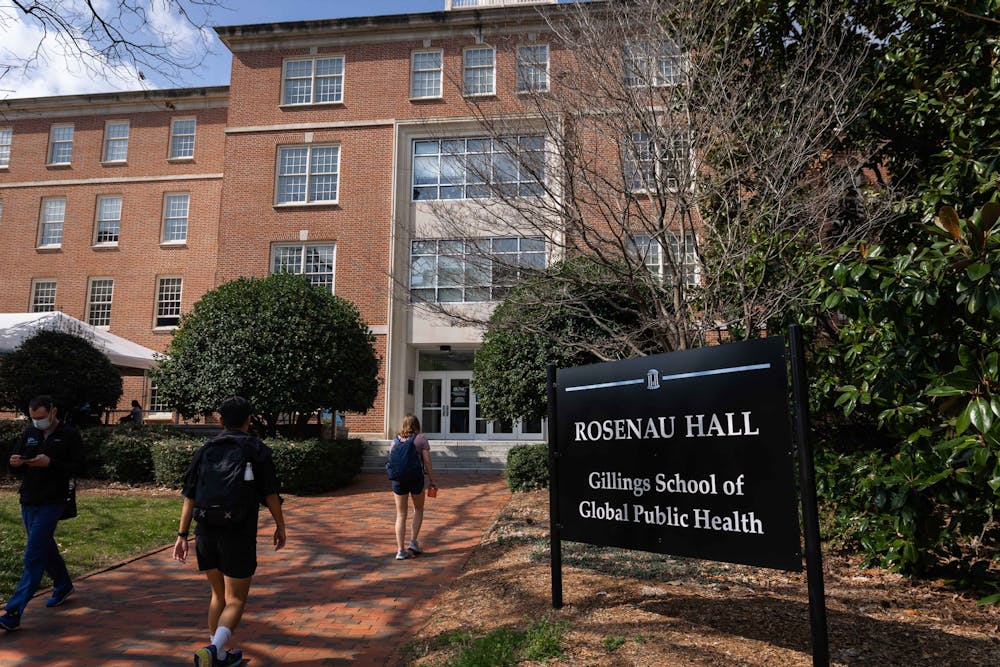On Friday afternoon, the UNC Gillings School of Global Public Health hosted a panel to shed light on gun violence and its status as a public health issue. The panel consisted of three experts: Distinguished political science professor Frank Baumgartner, health management professor Ciara Zachary and faculty chair Beth Moracco.
“At the University of North Carolina-Chapel Hill, we know about the terror that could strike a community when guns are the weapons of choice,” Leoneda Inge, WUNC host and the moderator of the panel, said.
The event consisted of three presentations from each of its panelists. While the presentations maintained the central theme of gun violence as a public health issue, each presenter dived into different areas of the topic.
Baumgartner, a Richard J. Richardson distinguished professor of political science at UNC, emphasized the importance of addressing and discussing gun violence.
“The first numbers are shocking and kind of scary," Baumgartner said. "The United States is simply a very violent country. We have routine basis on the order of 20,000 homicides in our country every year."
Moracco, an associate professor in the department of health behavior, said the lack of funding has only exacerbated the problem of gun violence.
“Although gun violence is among the top 10 causes of death, [research to prevent it] was the second least funded of the top 30,” she said.
In recent years, more pathways to research have been opened due to the replacement of the 1996 Dickey Amendment, which sought to prevent Centers for Disease Control and Prevention funding from being used to research the prevention of gun violence.
“In 2019, the Dickey document was repealed, and Congress approved $25 million in appropriations for the [National Institutes of Health] and the CDC, specifically on gun violence research," Moracco said. "We're starting to see the results of that."
Along with trying to educate the UNC community on gun violence as a whole, the panel hoped to shed light on the steps that UNC has taken since the gun-related campus lockdowns earlier this semester.
Brent Wishart, senior director of facilities at the public health school, said that three main things were addressed following the lockdowns: the inability to lock classroom doors, the inability to cover some windows and the lack of clear evacuation plans.
“We've hosted three active shooter training sessions," he said. "We've had one that was on Zoom and two in person at the School since the September lockdown."
Wishart also said plastic coverings have been implemented on some of the windows around campus, some of which were in the Gillings auditorium where the event took place.
Some students who attended the event emphasized the importance of gun violence as a public health issue, noting UNC's recent gun incidents.
Mac Lord, a UNC student attending the event, said that although resisting gun violence is important, it also seems hopeless given the current political climate.
“I think different perspectives like the public health perspective might be good ways of finding solutions to problems that have seemed impossible in the past," he said.
Zachary encouraged students attending, as well as the larger Chapel Hill community, to take action and advocate for change.
“There are a lot of different stages of how a policy is made and then how it's implemented and later evaluated, but those are all opportunities that you as advocates can shape policy," she said. "There's always a way, whether you want to be out in the street marching or if you want to be kind of behind the scenes giving advice."
While not promising change explicitly, some presenters encouraged students and faculty to be optimistic about the future of gun legislation.
“I don't want to say it's going to change within six months, but I do want to say that when I was in college, it would have been unimaginable to think of no indoor smoking or gay marriage," Baumgartner said. "Neither of those was on the horizon. And today both of those are the status quo."



